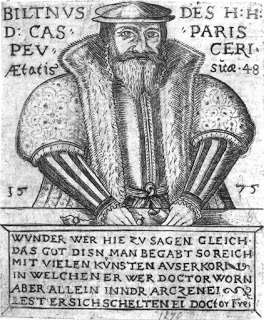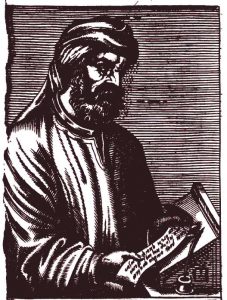Andrew Bryan, a slave in Savannah, Georgia, became a Christian while listening to another slave preach. Soon Bryan himself began to preach. Afraid that slaves who listened to black preachers would rise up in rebellion, plantation owners whipped and imprisoned Andrew Bryan. Afterward, he held up his hand and declared that he “would freely suffer death for the cause of Christ.”
Bryan’s slaveholder was upset at what had been done to Bryan and gave him the use of a barn for church services. Eventually Bryan bought his freedom, gathered a congregation of seven hundred, and built the First Baptist Church of Savannah.
Henry Oldenburg’s (c.1618–1677) false imprisonment
Henry Oldenburg, unpaid secretary of the Royal Society, spent the summer months of 1667 in the tower of London. As secretary, he maintained a voluminous correspondence. He had apparently complained to a foreign correspondent that the English navy had failed to prepare as it should. When the navy suffered humiliation, the government looked for individuals it could blame and fingered Oldenburg among others for treasonous correspondence. Although Oldenburg was not imprisoned for his faith, he was a man of faith and piety—the person who more than any other made the reputation of the young Royal Society, managing most of its scientific correspondence with such candor and tact that strangers were willing to trust their work to him.
Caspar Peucer, vulnerable theologian

[Kaspar Peucer—public domain, wikimedia File:Kaspar_Peucer.jpg]
Caspar Peucer spent twelve years in prison (1574 – 1586) over his interpretation of the Lord’s Supper. Strict Lutherans believed in the real presence of Christ in the Eucharist. “The body and blood of Christ are truly present, and are communicated to those that eat in the Lord’s Supper.” After Luther’s death Philipp Melanchthon and his followers (Philippists) promoted a view more in line with that of the Swiss Reformation, “with bread and wine are truly exhibited the body and blood of Christ to those that eat in the Lord’s Supper.” Continue reading “Caspar Peucer, vulnerable theologian”
Download “A Theology of Persecution”
Roy Stults has studied Christian theologians’ attempts from the first century of the church until recent times to explain the eternal significance of persecution and to appeal to persecutors for fair play. We present part one of his work as a downloadable PDF. Continue reading “Download “A Theology of Persecution””
Grafton learns the cost of Bible printing

The early printers of the Bible incurred great risks. Richard Grafton and Edward Whitchurch, together with Miles Coverdale, were entrusted to arrange for the printing of Thomas Mathew’s translation. The work was given to the printers in Paris, as the English printers were not very highly esteemed. The book was nearly completed when the Inquisition effectually stopped the further progress of the work by seizing the sheets, and Grafton with his companions were forced to flee. Richard Grafton and Whitchurch contrived to obtain their types from Paris, and the Bible was completed in 1539. Thus they became printers themselves, and as a reward for his labor, when the Roman Catholics again became rulers in high places, Richard Grafton was imprisoned. Continue reading “Grafton learns the cost of Bible printing”
Origen’s take on persecution

Origen was the son of a martyr and himself suffered imprisonment and torture late in life. A teacher and theologian, he wrote on persecution as one who had witnessed it and who was prepared to experience it. Although he suffered for his faith, contemporary church leaders condemned some of his teachings because they veered into heretical territory. Continue reading “Origen’s take on persecution”
Sentenced to Siberia
Basil Malof (born William Fetler—he changed his name because Fetler had been forced on his grandfather by German occupiers) was a successful Protestant evangelist in Petrograd (St. Petersburg), and publisher of the first religious journal in Latvia, Kristigais Vestnesis (Christian Herald). Converted at fifteen, he was baptized at night because the Orthodox Church persecuted evangelicals. Continue reading “Sentenced to Siberia”
Elisha Paine and the Freedom to Worship
When Elisha Paine preached as a Baptist, Massachusetts authorities threw him into a dirty prison at Worcester for unlicensed preaching (February 1743). He refused to post bond, believing to do so was to comply with an unbiblical and corrupt system. After his release in May, he continued to preach in that area for two weeks, then preached throughout New England from July into December. By the end of the year had given over 240 sermons. Continue reading “Elisha Paine and the Freedom to Worship”
Fifty Captives Freed for a Blind Man
In July 1900, Boxers martyred “Blind Chang” at Chaoyang, China.
Formerly an alcoholic, thief, gambler, and member of the notorious gang known as Vegetarians, he had become blind after expelling his wife from their home and forcing his daughter into prostitution. He made his way to a mission station where he was given a place to stay. There he heard the gospel and was transformed by the power of Christ. Continue reading “Fifty Captives Freed for a Blind Man”
Tertullian’s Thought on Persecution and Martyrdom

[Imaginary portrait of Tertullian.]
[Adapted from text by Roy Stults from his unpublished Historical Perspectives on a Theology of Suffering, Persecution, and Martyrdom] Tertullian was a prolific Christian writer of the early third century—an apologist (defender of the faith) and theologian. (Among his contributions to theology was the term “Trinity” to explain the Bible’s teaching on Father, Son, and Holy Spirit.) Persecution and martyrdom were often discussed in his apologetic writings. He shared some themes of earlier apologists but expanded the literature by introducing new themes that he wove into a unique argument to meet the situation of his day. Continue reading “Tertullian’s Thought on Persecution and Martyrdom”
